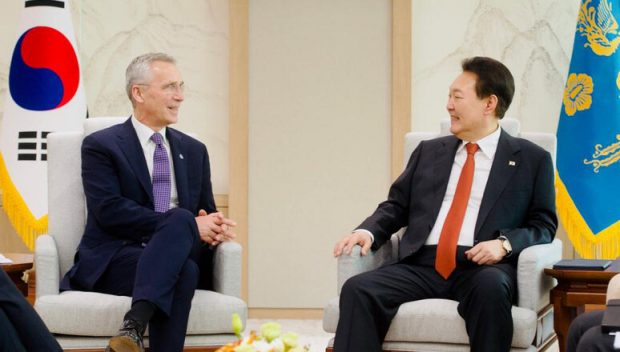South Korea’s dynamics with NATO to demonstrate its capabilities as a pivotal state

South Korea’s President Yoon Suk Yeol and NATO Secretary General Jens Stoltenberg in Seoul in January 2023
By Habib Toumi
TUNIS: History was made in the June 2022 Madrid North Atlantic Treaty Organization (NATO) summit with the groundbreaking participation of two far-eastern states, South Korea and Japan, as well as Australia and New Zealand, all partners from the Asia-Pacific region.
Within the strategic competition over the core principles of international security, this participation with its diplomatic overtures and enhanced multifaceted collaboration were seen as crucial for all parties with benefits for all.
In the Summit Declaration, NATO stated that the participation of its partners from the Asia-Pacific region demonstrated the value of cooperation in tackling shared security challenges.
The increasing significance of NATO’s relations with the Republic of Korea and other partners in the Asia-Pacific region – Australia, Japan and New Zealand-, forms an important aspect of the NATO 2030 agenda.
NATO believes that such closeness helps address cross-cutting security issues and global challenges, as well as to defend the rules-based international order.
Political dialogue and practical cooperation in several areas, including cyberspace, new technology and countering disinformation, are now being stepped up amid agreement between NATO and its partners in the Asia-Pacific, especially following the first-ever NATO foreign ministers’ meeting with the partners from the Asia-Pacific in December 2020.
In May 2022, a meeting of the NATO Military Committee in Chiefs of Defense session with Australia, Japan, the Republic of Korea and New Zealand was held at the NATO headquarters in Brussels.
That progress in their partnership as well as their steadily closer cooperation in other areas, such as maritime security, climate change and resilience, is crucial since global challenges demand global solutions, NATO said.
Topics addressed in the regular meetings between the North Atlantic Council and the Asia-Pacific partners have included the security situation on the Korean Peninsula, maritime security and climate change.
Political dialogue between them ensures they can enhance their mutual situational awareness on security developments in the Euro-Atlantic and Asia-Pacific regions.
During the dialogue, the Asia-Pacific countries contribute unique perspectives to NATO policy discussions on common security challenges, including cyber defense and climate change.
At the individual level, NATO and each of the partners in the Asia-Pacific have developed Individual Partnership Cooperation Programs, with cooperative activities focusing on topics of mutual interest including cyber defense, non-proliferation, civil preparedness and Women, Peace and Security.
NATO and the Republic of Korea have been engaged in dialogue and cooperation since 2005. However, since 2012, work has been taken forward through an Individual Partnership and Cooperation Program that was renewed in November 2019.
Priority areas being developed through political dialogue and practical cooperation include non-proliferation, cyber defense, counter-terrorism, security-related civil science projects, interoperability, chemical, biological, radiological and nuclear (CBRN) defense, as well as civil preparedness, resilience and disaster relief.
The Republic of Korea said it is interested in improving mutual understanding and interoperability through exchanges of civilian and military personnel, participation in education, joint training and exercises, and cooperation in the field of standardization and logistics.
In January 2023, NATO Secretary General Jens Stoltenberg said during a two-day visit to Seoul, that “NATO and the Republic of Korea share common values and concerns and underlined that the Alliance is committed to working with the Republic of Korea and other like-minded partners to promote peace and preserve the international rules-based order.”
During their meeting. Stoltenberg and Korea’s President Yoon Suk Yeol discussed common security challenges and how to strengthen the Alliance’s partnership with Seoul.
Noting that transatlantic and Asia-Pacific security are deeply interconnected, the Secretary General stressed the importance of like-minded democracies standing together to protect the international rules-based order.
At the next NATO summit in Vilnius, the capital of Lithuania, on July 11-12, the question remains whether relations between NATO and the Republic of Korea and the other Asia-Pacific partners will continue to gain in strength and intensity, and to send a clear message about a more robust commitment to shared political, economic and military values.

























































